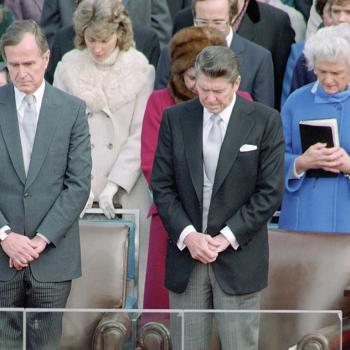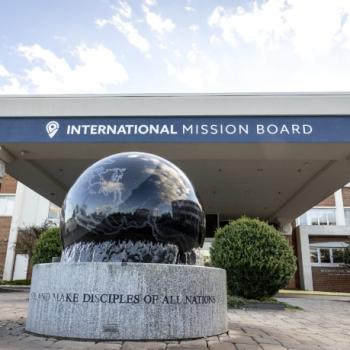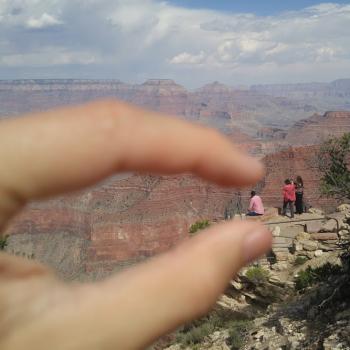In spite of some Christian revisionist attempts to cast them all as evangelical believers, the Founding Fathers’ faiths ran the gamut from traditional Christianity to outright skepticism. I wrote my biography of Patrick Henry because I was interested in how Henry, a traditional Anglican, sorted out the challenges raised by the Revolution, slavery, and other issues. Now I am writing a religious biography of Ben Franklin, a man who called himself a Deist, and yet was the solitary figure calling for the Constitutional Convention to open its sessions in prayer.
Perhaps the most evangelical of all the Founding Fathers, however, is one whom few Americans recall today: Elias Boudinot. Baptized as an infant in Philadelphia by the great evangelist George Whitefield, Boudinot embraced and defended evangelical principles throughout his prominent career as a Patriot in New Jersey and U.S. government official.

As I discuss in my document reader The Founding Fathers and the Debate Over Religion in Revolutionary America, Boudinot was a member and president of the Continental Congress, a member of the U.S. House of Representatives, and the director of the U.S. Mint from 1795 to 1805. Boudinot became increasingly alarmed about the rise of Deism and the attacks on traditional Christianity by Thomas Paine and others. He helped found the American Bible Society in 1816, and became the president of the American Society for Evangelizing the Jews in 1820 (John Quincy Adams was a vice president of this organization). Boudinot wrote Christian treatises such as The Age of Revelation and The Second Advent, which used prophecies from the Bible to argue that America risked losing the blessings of God if it continued to pursue faithlessness and worldliness. Here’s an excerpt from The Second Advent (again, taken from my document reader):
In the days of these kings, that is, of some of these kings, (the kingdoms of Babylon, Persia, Greece, and Rome) shall the God of Heaven set up a kingdom, which shall never be destroyed; and the kingdom thereof shall not be left to other people, but it shall break in pieces and consume all these kingdoms, and it shall stand for ever. Although the kingdoms and nations of Europe are first to be involved in this visitation from on high, yet even the United States of America have also reason to fear and tremble, when God shall arise “to shake terribly the earth.” It is true, that their constitutions have been long since formed and established on a purer basis.—The first settlers of this wilderness were the sons and daughters of banishment, flight, and persecution. This desert proved an asylum for the Church of Christ, when the enemy came in as a flood; then she flew into the wilderness, as on the wings of an eagle…
But has not America greatly departed from her original principles, and left her first love? Has she not also many amongst her chief citizens, of every party, who have forsaken the God of their fathers, and to whom the spirit may justly be supposed to say, “ye hold doctrines which I hate, repent, or else I will come unto you quickly, and will fight against you with the sword of my mouth.”
America has been greatly favoured by God, in all her concerns, both civil and religious, and she has much to hope, and much to fear, according as she shall attentively improve her relative situation among the nations of the earth, for the glory of God, and the protection of his people—She has been raised up in the course of divine Providence, at a very important crisis, and for no very inconsiderable purposes. She stands on a pinnacle—She cannot act a trifling or undecided part—She must determine whom she will serve, God or mammon—She stands by faith, and has great reason to take heed lest she should fall, from a vain confidence in her own internal strength, forgetting “the rock from whence she has been hewed, and the hole of the pit, from whence she has been digged.” …
Hearken then, ye who are happily delivered from many of the evils and temptations to which the European nations are exposed. Your fathers fled from persecution: a glorious country was opened to them by the liberal hand of a kind Providence;—a land, literally, flowing with milk and honey;—they were miraculously delivered from the savages of the desert;—they were fed and nourished in a way they scarcely knew how. Alas! what have been the returns, their descendants, of late years, have made for the exuberant goodness of God to them? The eastern states, however greatly fallen from their former Christian professions, were settled by a people really fearing God. “Remember therefore from whence thou art fallen, and repent, and do thy first works, or else I will come unto thee quickly and will remove thy candlestick out of its place, except thou repent,” that is, will deprive thee of those Gospel privileges with which thou hast been so greatly favoured.
Whatever you might think of Christians today who say we need to bring America “back to God,” it is a concern that evangelicals like Boudinot were expressing from the beginning of the nation.
[Friends, you can sign up here for my Thomas S. Kidd author newsletter. Each newsletter will update you on what’s happening in my writing and in the world of American religious and political history, and current events. It will contain unique material available only to subscribers, and each will help you keep up with my blog posts, books, and other items from around the web. Your e-mail information will never be shared. Thanks!]
















